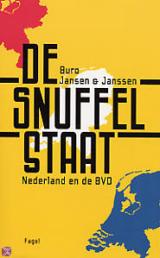
De Snuffelstaat
Buro Jansen en Janssen
223 pages including index
published in 2002
Buro Jansen en Janssen -named after the bumbling detective duo from the Tintin comics- is a Dutch leftwing collective which has set itself the goal of critically following the various Dutch police forces and intelligence services, as well as commenting on any new legislation that intrudes on civil rights. It was founded in 1984, as a response to the continuing harassement of leftwing groups as well as the squatters movement by the police and the intelligence services. Since then the buro has gotten a good reputation as a civil liberties watchdog, bringing out publications under its own name as well as supporting journalists writing on these issues and directly helping people caught up in intelligence service or police operations where appropriate.
The Snuffelstaat, best translated as The Snooping State, is one result of the buro's work, an overview of how the main Dutch intelligence service, originally called the BVD (Binnenlandse Veiligheids Dienst; internal security service), from 2002 onwards the AIVD (Algemene Inlichtingen en Veiligheids Dienst; general intelligence and security service) functions and the impact it has on Dutch politics as well as ordinary Dutch people. The Snuffelstaat is intended as a snapshot of the work of the BVD, its methods, ties to other intelligence services and networks in Holland and abroad and the legislation surrounding the work of the intelligence services in the Netherlands.
This does not always make for easy or interesting reading; much of the material covered here is by its very nature somewhat dry, even for somebody who is interested in this subject. Then again, this was never meant to be some sensational expose anyway. Neither is it intended as a polemic against the Dutch secret services, despite the authors' leftist backgrounds. The need for some sort of central intelligence service, as long as it's bound by sensible laws and has a well defined job description, is not disputed here. The problem is that currently, these boundaries are missing, with the AIVD having a very wide mandate to investigate organisations and people who may be a danger to Dutch society. Furthermore, many of the things it can do to fulfil its mandate are carefully defined in law to be as widely usuable as possible, with little regard for privacy or civil liberty concerns.
In 2002 a new law regarding the work of the intelligence services came into force in the Netherlands and De Snuffelstaat was written as a response. It was therefore written before the murder on Pim Fortuyn and subsequent developments, which as you may imagine sort of upset the picture presented here. The impression of the security services you get from reading this is that ever since the Cold War they've been looking for threats to justify their existence, whether these threats be terrorists of whatever nature, organised crime infiltrating Dutch business and politics, asylum seekers or radical Islam, without much tangible result. After the murder of Fortuyn this became a lot easier of course, even if they never saw it coming...
So the picture given in this book is slightly out of date, as "terrorism prevention" has now become the main justification for the service's continuing existence. However, the information given here about the way the service works and its structure and ties with foreign services is quite likely still largely correct. A good book to have on hand as a reference work.
Read more about:
Buro Jansen en Janssen,
De Snuffelstaat,
AIVD,
Dutch politics,
book review